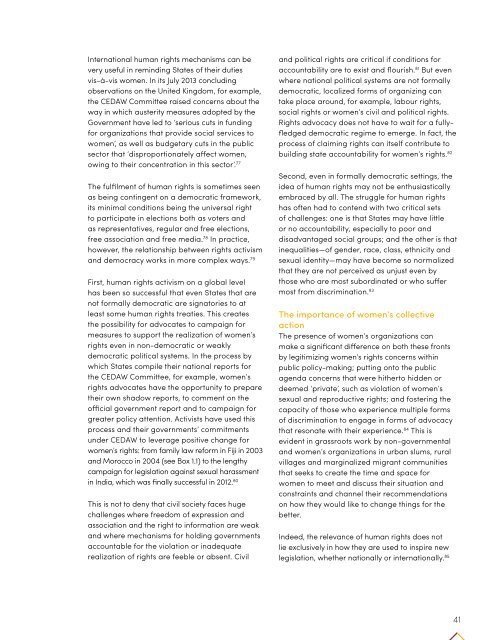1GzuFGC
1GzuFGC
1GzuFGC
You also want an ePaper? Increase the reach of your titles
YUMPU automatically turns print PDFs into web optimized ePapers that Google loves.
International human rights mechanisms can bevery useful in reminding States of their dutiesvis-à-vis women. In its July 2013 concludingobservations on the United Kingdom, for example,the CEDAW Committee raised concerns about theway in which austerity measures adopted by theGovernment have led to ‘serious cuts in fundingfor organizations that provide social services towomen’, as well as budgetary cuts in the publicsector that ‘disproportionately affect women,owing to their concentration in this sector’. 77The fulfilment of human rights is sometimes seenas being contingent on a democratic framework,its minimal conditions being the universal rightto participate in elections both as voters andas representatives, regular and free elections,free association and free media. 78 In practice,however, the relationship between rights activismand democracy works in more complex ways. 79First, human rights activism on a global levelhas been so successful that even States that arenot formally democratic are signatories to atleast some human rights treaties. This createsthe possibility for advocates to campaign formeasures to support the realization of women’srights even in non-democratic or weaklydemocratic political systems. In the process bywhich States compile their national reports forthe CEDAW Committee, for example, women’srights advocates have the opportunity to preparetheir own shadow reports, to comment on theofficial government report and to campaign forgreater policy attention. Activists have used thisprocess and their governments’ commitmentsunder CEDAW to leverage positive change forwomen’s rights: from family law reform in Fiji in 2003and Morocco in 2004 (see Box 1.1) to the lengthycampaign for legislation against sexual harassmentin India, which was finally successful in 2012. 80This is not to deny that civil society faces hugechallenges where freedom of expression andassociation and the right to information are weakand where mechanisms for holding governmentsaccountable for the violation or inadequaterealization of rights are feeble or absent. Civiland political rights are critical if conditions foraccountability are to exist and flourish. 81 But evenwhere national political systems are not formallydemocratic, localized forms of organizing cantake place around, for example, labour rights,social rights or women’s civil and political rights.Rights advocacy does not have to wait for a fullyfledgeddemocratic regime to emerge. In fact, theprocess of claiming rights can itself contribute tobuilding state accountability for women’s rights. 82Second, even in formally democratic settings, theidea of human rights may not be enthusiasticallyembraced by all. The struggle for human rightshas often had to contend with two critical setsof challenges: one is that States may have littleor no accountability, especially to poor anddisadvantaged social groups; and the other is thatinequalities—of gender, race, class, ethnicity andsexual identity—may have become so normalizedthat they are not perceived as unjust even bythose who are most subordinated or who suffermost from discrimination. 83The importance of women’s collectiveactionThe presence of women’s organizations canmake a significant difference on both these frontsby legitimizing women’s rights concerns withinpublic policy-making; putting onto the publicagenda concerns that were hitherto hidden ordeemed ‘private’, such as violation of women’ssexual and reproductive rights; and fostering thecapacity of those who experience multiple formsof discrimination to engage in forms of advocacythat resonate with their experience. 84 This isevident in grassroots work by non-governmentaland women’s organizations in urban slums, ruralvillages and marginalized migrant communitiesthat seeks to create the time and space forwomen to meet and discuss their situation andconstraints and channel their recommendationson how they would like to change things for thebetter.Indeed, the relevance of human rights does notlie exclusively in how they are used to inspire newlegislation, whether nationally or internationally. 8541


